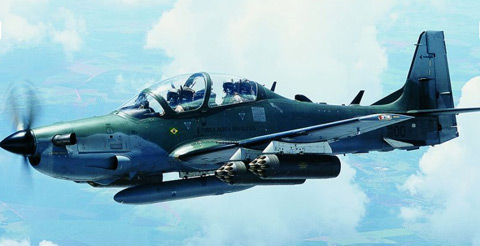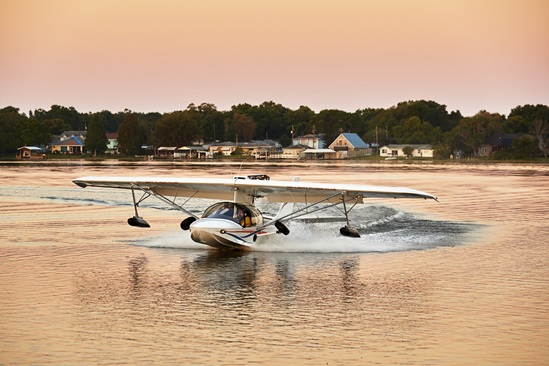Air Force halts controversial contract
Afghan light air support deal may be dead, analysts say

The Air Force on Feb. 28 canceled a contract to purchase the Embraer A-29 Super Tucano for duty in Afghanistan, following litigation and protest from rival Hawker Beechcraft.
The Air Force announced on Feb. 28 an abrupt about-face following a well-publicized dogfight over a contract to build light air support aircraft for Afghanistan.
Air Force Secretary Michael B. Donley, in a short statement that caught many by surprise, said the decision to award the contract to Brazilian manufacturer Embraer, by way of Sierra Nevada Corp., will be “set aside” pending an internal Air Force investigation.
Hawker Beechcraft, rumored to be on the verge of bankruptcy, launched federal court action seeking to block the contract, claiming the company’s AT-6 was a better match for the mission of arming a fledgling Afghan air force. The company also marshaled allies in Congress, including Kansas Rep. Mike Pompeo, who hailed the Air Force decision to cancel the contract in a conference call with the media. Pompeo said the Air Force process was “deeply flawed,” though he cited the lack of transparency as one reason that the specific flaws remain unknown.
“They’ve now had to undo an award,” Pompeo said. “That is evidence alone that the process was a failure.”
Industry analyst Richard Aboulafia of the Teal Group said the deal, with a maximum possible value between $150 and $500 million over a period of years, is of relatively little consequence to either company, and may be best left undone given recent violence and deterioration of the situation in Afghanistan.
“If they’re looking for a convenient way to get out of a perfectly ridiculous project, this would be it,” Aboulafia said, adding that the “only possible relevance [is] for a military that we are currently disengaging from. Do you want to kill it now, or do you want to let it linger like a dead woodchuck under the porch?”
Pompeo agreed that the overall mission in Afghanistan merits careful consideration, but insisted the Air Force decision was not related to recent developments in the war-torn country. Pompeo agreed that a “major reassessment” of Afghanistan strategy could make the contract moot, but the procurement process needs to be reformed.
"While we pursue perfection, we sometimes fall short, and when we do we will take corrective action,” Donley said in the statement. “Since the acquisition is still in litigation, I can only say that the Air Force Senior Acquisition Executive, David Van Buren, is not satisfied with the quality of the documentation supporting the award decision."
Hawker Beechcraft, which publicly protested the Air Force decision in December to exclude Hawker’s AT-6 from a two-plane competition with the Super Tucano issued a statement Feb. 28 hailing the contract’s cancellation.
“We commend the Air Force for this decision and we believe strongly it is the right thing for the Air Force, the taxpayers and the people of Hawker Beechcraft,” said Bill Boisture, chairman of Hawker Beechcraft Corp. “We look forward to competing for this contract as this important initiative moves forward.
Sierra Nevada Corp. also issued a written statement, quoting Vice President of ISR Business Development (and retired Air Force general) Taco Gilbert: “We are disappointed by this decision. We offered the U.S. Air Force a fully proven and cost-effective Light Air Support solution--and one that would be made in America, create and support American jobs and result in economic investment in the U.S. We know that our submission fully met the requirements of the U.S Air Force Request for Proposal (RFP) and that Sierra Nevada Corporation fully complied with the RFP process as set out by the U.S. Air Force,” Gilbert said.
Both companies claimed a winning bid would support American jobs, and analysts said there was realistically little difference in that respect.
Wayne Plucker, a senior industry analyst with Frost & Sullivan’s aerospace and defense group, said the LAS contract may not survive post-election budget cuts, or further deterioration on the ground in Afghanistan. Plucker said it’s too soon to say whether the Air Force decision will lead to a new round of bidding, which would delay deployment by at least a year.
"Kicking the can down the road always endangers a project. We’ve seen that with multiple Air Force and Navy projects over time,” Plucker said. “The real key is how quickly this turns around.”
Air Force Gen. Norton Schwartz told news agency AFP the decision is an "embarrassment" to the Air Force, and vowed the Air Force would move quickly to reopen bidding.
"There's no way to put a happy face on this," Schwartz said, noting that funding for up to 20 aircraft expires in 2013. Schwartz said the aircraft is vital to Afghanistan's military. "We will work with all dispatch."


